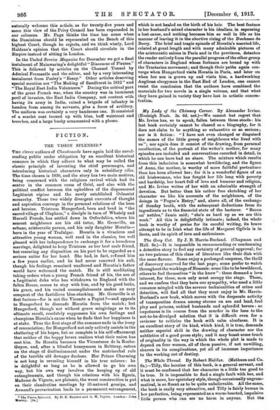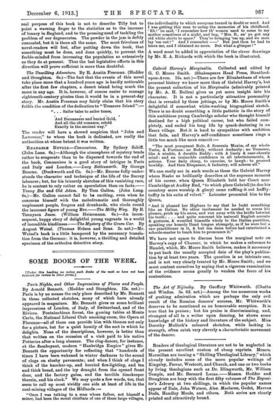The White Thread. By Robert Halifax. (Methuen and Co. 6s.)—Tilly,
the heroine of this book, is a general servant, and it must be confessed that her character is a little too good to • be true. It is impossible to find a single fault with her, and what is more, her epistolary style, though occasionally ungram- matical, is so fluent as to be quite unbelievable. All the same, the book is really very attractive, and Tilly is fairly human in her perfection, being represented as a warm-hearted, impulsive little person who can see • no harm in anyone. But the real purpose of this book is not to describe Tilly but to point a warning finger to the statistics as to the increase of lunacy in England, and to the pressing need of tackling the problem of our degenerates. The powder in the jam is deftly concealed, but it is there all the same. The most frivolous of novel-readers will feel, after putting down the book, that something mast be done, and done quickly, to prevent the feeble-minded from increasing the population so extensively as they do at present. That the last legislative efforts in this direction will prove sufficient is more than doubtful.
The Unwilling Adventure. By R. Austin Freeman. (Hodder and Stoughton. 6s.)—The fact that the events of this novel take place more that a hundred years ago is hardly noticeable after the first few chapters, a desert island being much the same in any age. It is, however, of course easier to manage eighteenth-century pirates than it would be in a present-day story. Mr. Austin Freeman may fairly claim that his story fulfils the condition of the dedication to "Treasure Island" :— ". . . Sailor tales to sailor tunes,
And Buccaneers and buried Geld,
And all the old romance, retold Exactly in the ancient way."
The reader will have a shrewd suspicion that "John and Lawrence," to whom the book is dedicated, are really the authorities at whose behest it was written.



































































 Previous page
Previous page